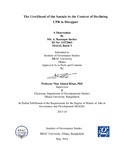| dc.description.abstract | Bangladesh is a small country with rich varieties of cultural dimension. Our culture, economy,
society are enriched not only with the Bengalis (plain land people) but also with the several
hundred tribal communities of the country who live in the Hill areas as well as in the plain
districts of Dinajpur, Rajshahi, Sylhet and in the plains forests in Dhaka, Tangail, Mymensingh
and Jamalpur. Bangladesh had to go under a several political, social, economical and natural
changes during the last three hundred years. The plain land Bengalis could better accommodate
the changing situation than the tribal communities. As the land was ruled by the leader of the
plains, state policy went in favor of them. The plain land Bengalis, the state itself, sometimes the
nature also were the hostile host of the tribal. Land grabbing is one of the major problems faced
by tribal people all over the country. Land is taken by force, fraud or bribery. In many cases,
powerful locals in the regions have muscled out illegally acquiring tribal-owned land, through
pillage, murder and fire. Successive governments have carried out successive re-settlement
programs, ousting the tribal populace from their settlements and agricultural land and bringing in
Bengalis from the plain land.
The tribal people are very friendly with nature for their shelter and food. The nature is exposed
with its plenty of resources to the tribals. The common pool resources like the forest, jungle,
hills, haors, baors, rivers, bills, and marshland were the main sources of their food. They could
easily collect their livelihood without depending on others. Due to multi-sectoral industrial
advancement the nature is being destroyed. Every sector’s performance is measured with market
economy, not with ethical and traditional value. That is why the forest, jungle, hills, haors, baors,
rivers, bills, marshland are used for commercial purpose. The tribals are losing their sources for
living. The plain land tribal; Santal, Hajong, Dalu, patro, Mahatro, Khashi, pahan, Oraon were
basically dependent on bills, forest, marshland, jungle to collect food. Now they are passing a
crisis hour as their area of living gets shrunken rapidly. They are to shift their age old profession
and face livelihood crisis. Now it is very urgent for the government to give attention to the plain
land tribal and take time bound steps for their professional and economic rehabilitation. Special
arrangements are to be made for the tribal so that they can continue their way of living restoring
own culture which will also enrich the national cultural heritage. Thus the constitutional
guarantees will be ensured that all citizens of Bangladesh are equal in the eyes of the law and
that there shall be no discrimination against any person. | en_US |

